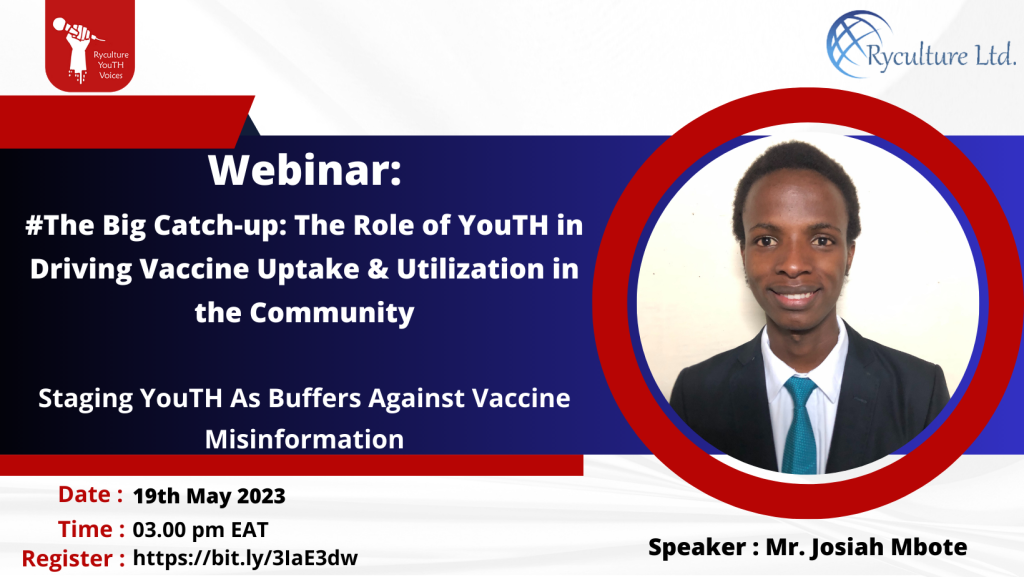The unprecedented rapidity with which the COVID-19 vaccines were developed advanced an already existing fear within the masses. The fear of vaccines was augmented to an extent that it rivalled fear of the virus itself. While some of the rationales underlying this fear were reasonable, most were based on psychological perceptions and misconceptions. This phenomenon created fertile grounds for cultivation of conspiracy theories and other accounts of misinformation. The effects of these accounts still persist to date and have immensely hampered the public’s perception towards vaccines promoting vaccine hesitancy. Digital spaces provide more efficiency for the spread of misinformation and given that the youth comprise the majority shareholders of these spaces, they can act as important regulators of information consumption.
Understanding the mechanisms through which misinformation is disseminated is a critical step towards this endeavor. The convincing power of any piece of information can be described using the Aristotle’s triangle whose vertices are ethos, logos, and pathos. Ethos refers to the credibility of a source, logos is the logical attribute of the information and pathos encapsulates the emotional appeal of the content. Proprietors of false information project the pathos of their content above their credibility or the logical appeal of what they spread. They capitalize on what is likely to stimulate emotional engagement, such as creating an ‘us’ vs ‘them’ scenario as in the vaccine case. Here, they present abstract concepts as the public’s enemy and give a variety of situations likely to appeal to the masses. For instance, some conspiracy theories claim that vaccines are a way through which stakeholders of the “New World Order” use to control population growth. Others argue that the virus was introduced for the purpose of marketing vaccines to enrichen companies, thus dismissing the altruistic motives of any vaccine provision programs. These sentiments spread at alarming rates within the public increasing the challenges associated with vaccine uptake and utilization.
The youth can regain control of the digital spaces by using the Aristotle’s triangle to their advantage. Deconstructing false information can be done through extending the elements of logos and ethos to overwhelm the mere pathos on which it thrives. The youth have an obligation of obtaining factual information from credible sources and presenting it to the public. They should focus on the logical networks of how vaccines are made, how they work, and their benefits. They should acquire this information from health personnel and cite them when presenting to the public. Upon encountering accounts of false information, the youth should be quick and bold to dismantle them by offering more accurate and verifiable information. This initiative of promoting digital literacy and stronger civics can be instrumental in protecting the public from psychological barriers of vaccine uptake.
Staging Youth as Buffers Against Vaccine Misinformation
The unprecedented rapidity with which the COVID-19 vaccines were developed advanced an already existing fear within the masses. The fear of vaccines was augmented to an extent that it rivalled fear of the virus itself. While some of the rationales underlying this fear were reasonable, most were based on psychological perceptions and misconceptions. This phenomenon created fertile grounds for cultivation of conspiracy theories and other accounts of misinformation. The effects of these accounts still persist to date and have immensely hampered the public’s perception towards vaccines promoting vaccine hesitancy. Digital spaces provide more efficiency for the spread of misinformation and given that the youth comprise the majority shareholders of these spaces, they can act as important regulators of information consumption.
Understanding the mechanisms through which misinformation is disseminated is a critical step towards this endeavor. The convincing power of any piece of information can be described using the Aristotle’s triangle whose vertices are ethos, logos, and pathos. Ethos refers to the credibility of a source, logos is the logical attribute of the information and pathos encapsulates the emotional appeal of the content. Proprietors of false information project the pathos of their content above their credibility or the logical appeal of what they spread. They capitalize on what is likely to stimulate emotional engagement, such as creating an ‘us’ vs ‘them’ scenario as in the vaccine case. Here, they present abstract concepts as the public’s enemy and give a variety of situations likely to appeal to the masses. For instance, some conspiracy theories claim that vaccines are a way through which stakeholders of the “New World Order” use to control population growth. Others argue that the virus was introduced for the purpose of marketing vaccines to enrichen companies, thus dismissing the altruistic motives of any vaccine provision programs. These sentiments spread at alarming rates within the public increasing the challenges associated with vaccine uptake and utilization.
The youth can regain control of the digital spaces by using the Aristotle’s triangle to their advantage. Deconstructing false information can be done through extending the elements of logos and ethos to overwhelm the mere pathos on which it thrives. The youth have an obligation of obtaining factual information from credible sources and presenting it to the public. They should focus on the logical networks of how vaccines are made, how they work, and their benefits. They should acquire this information from health personnel and cite them when presenting to the public. Upon encountering accounts of false information, the youth should be quick and bold to dismantle them by offering more accurate and verifiable information. This initiative of promoting digital literacy and stronger civics can be instrumental in protecting the public from psychological barriers of vaccine uptake.
Article written by Mr. Josiah Mbote – a pharmacy student and health advocate.

